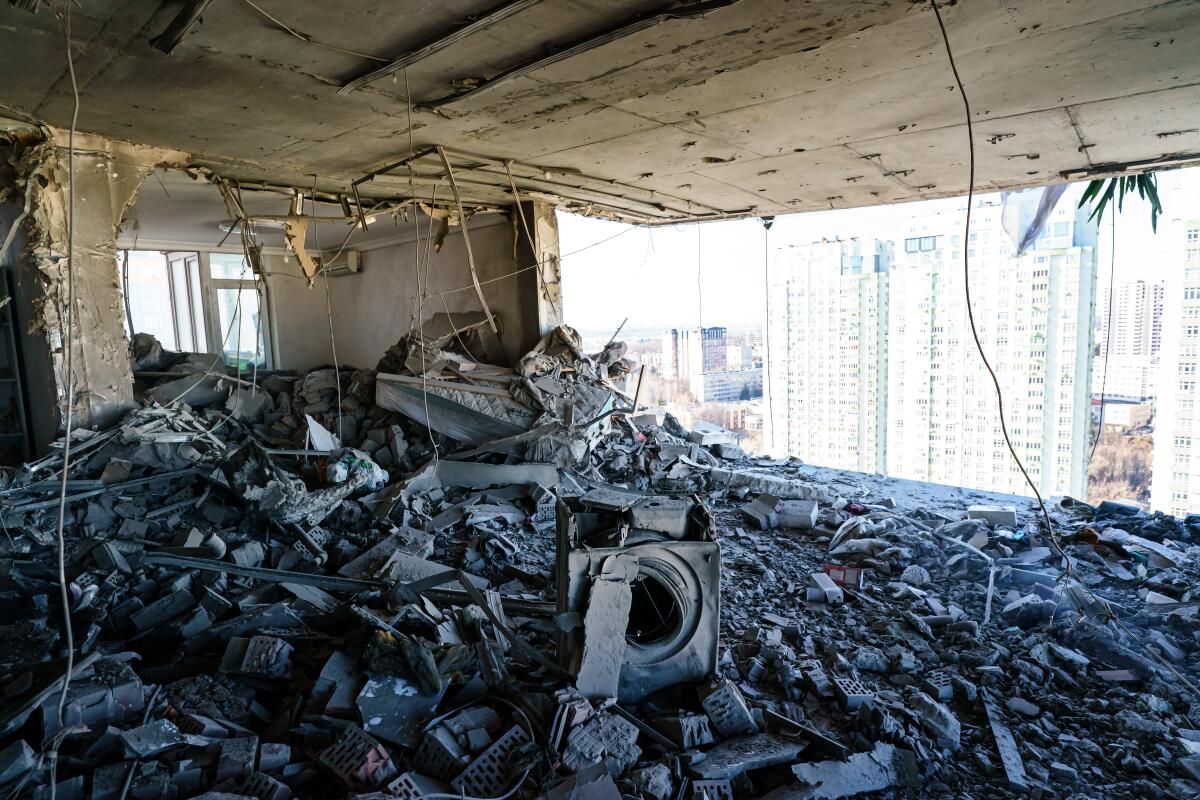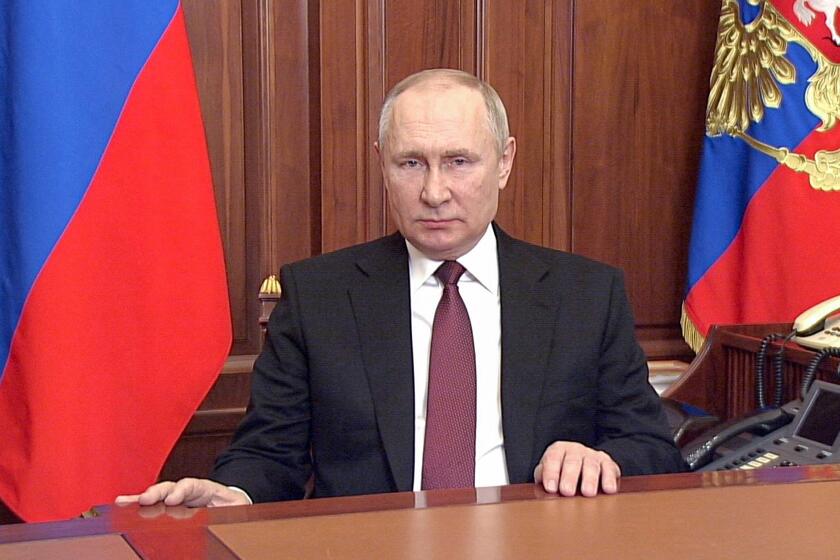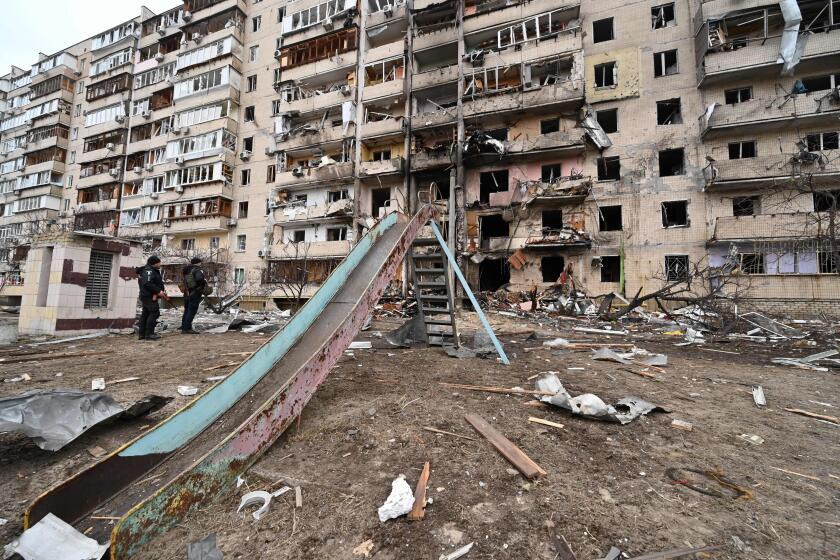Column: Putin has forced the West to change how it views its role in the world

In “The Sun Also Rises,” Ernest Hemingway famously answered the question “How did you go bankrupt?”
“Two ways…Gradually, then suddenly.” The last week suggests that getting out of bankruptcy works the same way.
It’s difficult to exaggerate the suddenness and significance of the change in attitudes — and policies — wrought by Russia’s unprovoked and indefensible invasion of Ukraine. Imposing banking sanctions via the SWIFT system was considered too heavy a lift on the eve of the invasion. Now it has started in the U.S., Canada, Japan, the European Union and even “neutral” Switzerland. The U.K., long addicted to Russian oligarch money, has announced an asset freeze. BP and Shell Oil have announced they will divest from Russia as will Norway’s sovereign wealth fund.
Russian planes — including the private jets of oligarchs desperate to rescue their money — cannot fly over the EU. Russian vodka is being pulled from shelves worldwide, and FIFA has kicked Russia out of the World Cup.
It may be that Russia will still manage to win some sort of military victory in Ukraine. But even if it does, the future does not look good for Putin.
But these moves pale in significance compared with the EU’s decision to provide lethal military aid to Ukraine, reversing a longstanding policy against selling arms to countries in “conflict zones.” The EU is even scrounging up fighter jets for delivery to Ukraine.
Meanwhile, Germany’s about-face is simply staggering. For years, Germany pursued a repugnant codependent relationship with the Putin regime; now they sound like they want a divorce. And not just from Russia, but from the hyper-pacifist politics that defined German foreign policy for a generation. Its last move under the old paradigm was to offer Ukraine 5,000 helmets and a field hospital. The scorn this meager gesture invited from allies, but more importantly from the German public, in the wake of Russia’s onslaught, led German Chancellor Olaf Scholz to tear up his predecessor Angela Merkel’s policies. Not only is Germany sending 1,000 shoulder-launched anti-tank rockets and 500 surface-to-air Stinger missiles, Scholz announced a commitment to a permanent increase in defense spending to finally meet NATO’s 2% of GDP requirement.
Obviously, the events unfolding in Ukraine are the primary driver of all this. Except for diehard Putin apologists, few can bear witness to Ukrainian heroism and Russian villainy and perfidy and not be moved. Ukrainian President Volodymyr Zelensky’s stirring appeals to the EU, public and private, have been crucial.
“Example is the school of mankind,” Edmund Burke said, “and they will learn at no other.” In other words, the bloody reality on the ground demonstrated a fact that theoretical or historical arguments could not; the relative peace of the post-World War II order was not sustained — or sustainable — by talk and paper agreements alone.
But as with bankruptcy, this sea change was a long time coming and America has a lot to do with it.
The U.S. and other Western nations send Russia an average of $500 million for energy every day, effectively financing Putin’s aggression in Ukraine.
Domestic partisan talking points are fairly useless in understanding our role in hastening this revolution in attitudes and policy. Donald Trump’s exaggerated claims that his administration was tougher on Russia than either his successor or predecessor have some merit. He maintained some of Barack Obama’s sanctions and imposed additional ones. Trump even signed, reluctantly, a sanctions bill on the Russian Nord Stream 2 pipeline, which President Biden lifted.
But this leaves out two important points. First, many of the policies imposed by Trump’s administration were pushed by officials working around his preferences. Second, and more important, Trump incessantly signaled that America’s bipartisan commitments to longstanding security arrangements could no longer be assumed to be permanent.
And not just rhetorically. In Syria, for example, Russian forces attacked American troops and we did nothing, save ultimately retreat from Syria. Trump was impeached for using — clearly needed — security aid to Ukraine as a bargaining chip to extract partisan ammo against Biden. Allied governments saw Trump’s open hostility to NATO, his indifference to South Korea and his rhetorical sycophancy for Putin and other despots and their strategic calculations changed.
Similarly, while Biden deserves qualified praise for his handling of the Ukraine crisis, it’s meager compensation for the blow to American credibility struck by his incompetent withdrawal from Afghanistan. Putin might well have invaded Ukraine absent the Afghanistan debacle, but it’s hard to see how he didn’t take it as a sign that America and NATO had lost the will to fight. And Obama’s refusal to enforce his own “red line” in Syria, after Russia’s client Bashar Assad crossed it, not to mention his relative acquiescence to Putin’s seizure of Crimea, sent the wrong signals to friends and foes alike.
The international order abhors a vacuum, and America’s shrinking role in the world — real and perceived — over at least three administrations made it reasonable for Putin to gamble that the sun was setting on that old order. But, as Hemingway said, the sun also rises.
More to Read
A cure for the common opinion
Get thought-provoking perspectives with our weekly newsletter.
You may occasionally receive promotional content from the Los Angeles Times.













